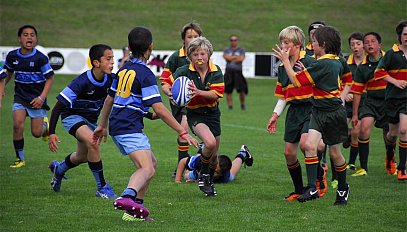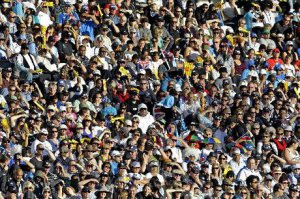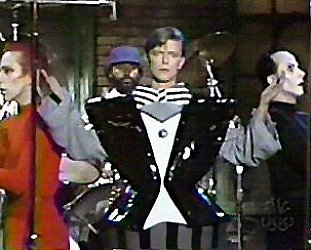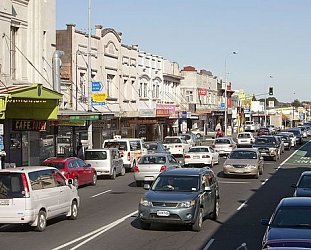Graham Reid | | 6 min read

The dinner party in a smart Auckland suburb in 2006 was thick with well-travelled intelligence: journalists, writers, academics, IT innovators and taste-makers from television and student radio. A multi-cultural mix of middle-class Kiwis.
And the subject being loudly discussed was . . . rugby. Specifically the test between the South African Springboks and New Zealand’s All Blacks which would screen at 7.30pm.
Right on time the television came to life and the partygoers -- an equal gender split -- hunkered down with drinks to cheer, make witty asides, discuss players and their performance, and to applaud another -- if somewhat inevitable -- All Black victory.
The following day the Sunday papers gave over pages to an analysis of the AB’s tactics, the worries for selectors as injuries were tallied, and each player being rated out of 10 for their performance. Some papers had three or more columnists, among them former All Blacks or coaches, offering comment.
The possibly alarming thing about this sporting obsession for tourists to New Zealand is that parties which stop for a game, and the endless post-match analysis, are not unusual.
This is a land where rugby is akin to a religion and its professional players are accorded big salaries and iconic status.
A new haka, the menacing Maori challenge performed before the start of test matches, written for the All Blacks a year before -- which involves a controversial throat-cutting gesture -- was still the subject of debate. Its symbolism is either emblematic of latent violence within Kiwi society, or a powerful “let’s go get ‘em” attitude, depending on which side of the debate you are on.
But rugby’s a physical game, so . . . get over it?
And when played well it is also -- in the words of Dr Graeme Downes of the rock band the Verlaines, with a doctorate in the music of Mahler -- “ballet, with a point”.
Rugby combines physicality (when burly forwards wrestle to gain ball possession in rucks, scrums and lineouts) with speed and flair (when the ball spins out along the backline and fast-paced players attempt to break through the opposition to score a try). It also has a random factor: the oval ball can bounce in odd and unpredictable ways.
Rugby is a cornerstone of New Zealand society and, as other historically cherished aspects of Kiwi life have been eroded by modern life, it remains a cultural adhesive.
The nation’s fascination with the sport goes back to European settlers who came to this rugged land two centuries ago and forged farms out of dense native bush.
These were people for whom hard work found its counterpart in sport which was also physical.
Unlike Britain where rugby was, and largely remains, a sport favoured by the middle-classes and upward, in New Zealand -- a country which prided itself on its egalitarianism -- it was adopted by people across society. Maori -- a warrior people of vigorous physicality -- also embraced the game, and despite social background and the cultural divides, all were equal on a playing field and in the rugby club afterwards which was often the cultural hub of small towns.
When my family arrived in New Zealand from Scotland I was indoctrinated into rugby. From the age of 6 until I was 21 I played two games -- one for the school, the other for the local club -- every Saturday. Four after-school practices a week.
I recall my secondary school chemistry teacher -- a man required to coach rugby but who had little passion for the game -- saying friends made at rugby would stay with you for life.
We cynical boys laughed off this sweeping statement. But now, many decades on I look at the few friends I have kept from school days and . . . he was right.
Yes, you can avoid rugby in New Zealand -- but you have to make strenuous efforts.
The presence of the All Blacks is impossible to ignore: the heavily sponsored team or its individual members tout everything from sports gear, energy drinks and the national airline, to taking time out to read with your kids.
At an exhibition at the Auckland City Art Gallery around the time of that dinner party one of the guest speakers -- articulate, witty and well-informed -- was former captain and current All Black Anton Oliver, a man whose face betrays decades of being at the bottom of ruck.
No one was particularly surprised that Oliver -- the son of a former All Black hardman captain, and a man of intelligence and refinement despite the bruising day job -- should be there. Less so that many of the tall, dark and chiselled Pacific Island players in the team should appear on billboards with a smouldering sexuality.
There is a roll call of All Black names which can have locals sighing with nostalgia: iconic Maori players such as Waka Nathan and Mac Herewini; the powerful goal kicker Don Clarke who could put a ball between the opposition’s uprights from within his own half if required; famous families like the Goings (Sid, Ken and other brothers); men of the heartland like the enormous farmer Colin Meads; the inspirational and intellectual captain Wilson Whineray (now the late Sir Wilson); the towering Jonah Lomu; the brilliant, dreadlocked Tana Umaga . . .
There are classic international confrontations: against the flamboyant and unpredictable French; against various teams from Britain and Ireland whose heritage many of Kiwis share; against the Lions whose off-field supporters, the boozy Barmy Army, are always given a warm welcome; the trans-Tasman rivalry with Australia; and bruising confrontations with South Africa.
The closest New Zealand came to a civil war in recent history was over rugby: the 1981 Springbok tour which scored a line between those who would no longer accept a team from an apartheid nation, and those who felt sport should be beyond politics.
There were street riots, games were halted by anti-tour protesters, and the country was divided.
My father and I heatedly parted company over “the Tour”. He felt sport and politics shouldn’t mix, I was of the other opinion. In the end we simply agreed not to talk about it.
Rugby wasn’t just a game then, it was cultural flashpoint.
The sport has always been a mirror of and metaphor for New Zealand society.
Fifty years ago most All Blacks -- the Parliament of the day was cut along similar lines -- were tough farmers from provincial towns where rugby was played on a hard paddock.
Today in the professional era however All Blacks, like most of the population, are often urban -- in the case of art-appreciating Oliver and others, urbane -- and a significant number are Polynesian who have an immediate advantage of size and physical strength.
New Zealanders’ passion for the game is undiminished by the changes of the modern era: yet rugby reflects an aspect of Kiwi culture that still exist as our society has become stratified by income levels.
Consider that other great Kiwi icon, the family bach -- usually a cheaply constructed holiday home near a beach.
The bach was also a great cultural leveller and over summer months everyone -- Jack and his master -- would head off to these unprepossessing places and bask in the summer sun and the egalitarianism that beaches and backyard barbecues invite.
 These days however the modest family
bach has all but disappeared, bulldozed to make room for massive
holiday homes of the wealthy.
These days however the modest family
bach has all but disappeared, bulldozed to make room for massive
holiday homes of the wealthy.
But rugby remains the constant at the core of the Kiwi psyche and its belief in social equality.
The stands at a rugby match at the famous Eden Park in Auckland sees Kiwi egalitarianism at work. Jack and his master side-by-side.
Even Rob Fisher -- twice the head of the New Zealand Rugby Union, and who helmed the Eden Park redevelopment for the 2011 Rugby World Cup -- sits in the stands rather than the comfort of a corporate box.
“You feel less conspicuous jumping up and down and shouting than you do sitting in a box,” he said.
Rugby, on the field or off, denies class and culture. At any big game television cameras reveal a snapshot of New Zealand as it is today: Maori and Polynesian sit alongside Japanese and Korean students, young and old, and men and women roaring for the same reason.
Rugby crowds -- unlike English soccer fans -- are not separated on terraces, other than by choice when overseas supporters block-book seats in advance. At a match you may find yourself alongside someone barracking for the other team. That’s accepted in good spirit because everyone knows that, despite this being life or death for 80 minutes, it’s only a game after all -- and you’ll probably end up in the same pub anyway.
Rugby and beer are soulmates.
Coincidentally, the night of that suburban party I mentioned the New Zealand netball team were also playing. These women were talented, dedicated, and play a sport where a result can depend on a last minute shot. It is a thrilling game.
But after the rugby, party-goers either went back on the patio to enjoy the evening, headed home to relieve the babysitter, or made for a nightclub.
No one watched the netballers thump the Aussies.
I mean, who really cared?
About the Author
Graham Reid is an award-winning New Zealand journalist, travel writer and author, a well regarded music critic, and has lectured on journalism, art and popular culture. More importantly he once kicked the winning goal for Cornwall against College Rifles, and scored 27 points in one game which included a handy try in which he took a difficult ball on halfway, neatly sidestepped four opposition players, and placed the ball between the uprights. He converted the try himself. He lives two minutes walk from Eden Park -- and all three of his sons played soccer.





post a comment